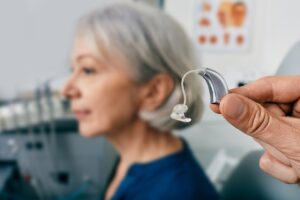 Studies have found that people with hearing loss are at an increased risk for developing dementia later in life, but there is good news. Wearing and using a hearing aid may help reduce this risk.
Studies have found that people with hearing loss are at an increased risk for developing dementia later in life, but there is good news. Wearing and using a hearing aid may help reduce this risk.
Today, we’ll explore the connection between hearing impairments and dementia to better understand how properly using a hearing aid can protect against cognitive decline.
Advertisement
If you or a loved one is experiencing hearing loss, consider the fact that there may be more at stake than just a minor inconvenience. A new study recently published in The Lancet Public Health journal looked at data from 437,704 people who were part of the UK Biobank database. Self-reported questionnaires were used to collect information on the presence of hearing loss and the use of hearing aids. Dementia diagnoses were determined using hospital records and death register data. The average age of participants was 56 years, and the study follow-up was an average of 12 years.
During the follow-up, around three-quarters of the participants had no hearing loss, but the remaining one-quarter had some hearing loss. Among those, 11.7% used hearing aids. The researchers concluded that participants with hearing loss who were not using hearing aids had a 42% higher risk of all-cause dementia compared to participants with normal hearing. No increased risk was found in people with hearing loss who used hearing aids.
“Close to four-fifths of people experiencing hearing loss do not use hearing aids in the UK. Hearing loss may begin early in one’s 40s, and there is evidence that gradual cognitive decline before a dementia diagnosis can last 20 to 25 years. Our findings highlight the urgent need for the early introduction of hearing aids when someone starts to experience hearing impairment.
A group effort from across society is necessary, including raising awareness of hearing loss and the potential links with dementia, increasing accessibility to hearing aids by reducing cost, and more support for primary care workers to screen for hearing impairment, raise awareness, and deliver treatment such as fitting hearing aids,” said study author, Dongshan Zhu.
During the study, researchers also examined how other factors may impact the associations between hearing loss and dementia. This included factors such as loneliness, depression, and social isolation. It was suggested that less than 8% of the association between hearing aid use and decreased dementia risk could be removed by improving psychosocial problems. This indicates that the increase in dementia risk is most likely due to the direct effects of hearing aids rather than indirect causes.
Protecting Brain Function and Hearing
Advertisement
As this study goes to show, many factors can take a toll on the brain. This can affect brain health, memory and overall cognitive function. The Smart Pill can help counteract these effects through nine ingredients that help support, nourish, and maximize brain health and cognitive function. These include ginkgo biloba, huperzine A, bacopa extract, rosemary extract, and a B vitamin complex. This unique formula helps boost circulation, fight free radicals, and help to promote clear thinking.
If you or a loved one are experiencing hearing loss, acting as soon as possible is vital. It is also helpful to focus on prevention before hearing loss becomes an issue.
Hearing Rescue may be able to help thanks to its unique formula of vitamins, minerals, and herbal extracts. This includes ingredients that possess antioxidant properties, which combat free radicals. One of its main ingredients is folate which has been found to help support people with low levels of folic acid suffering from age-related hearing loss.
